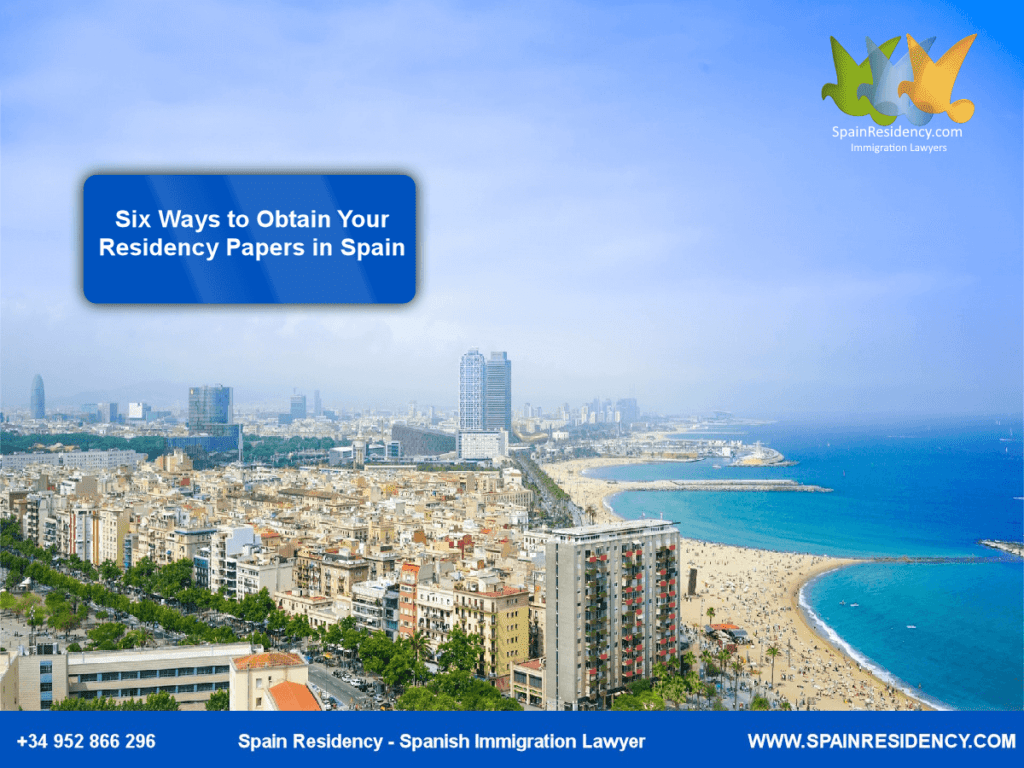Spain is a land of endless possibilities which beckons countless foreigners and their families seeking a fresh start and boundless horizons, here we discuss the six ways to obtain residency papers in Spain.
Though diverse in backgrounds, they share a common goal: obtaining their papers in this beautiful country.
The process of securing your papers entails regularizing your status and acquiring a residence and work permit in Spain. Yet, the journey to a regular residence permit can be labyrinthine, particularly when applications must be initiated from the homeland (at the Spanish consulate) before legal entry into Spain.
Consequently, a substantial segment of the foreign community turns to the residence permit for exceptional circumstances – the “arraigo.” Designed for those already residing irregularly in Spain, this avenue has emerged as one of the most frequented paths to paper procurement.
To that end, what precise steps must one undertake to achieve this objective?
Within the confines of this article, we shall delve into the minutiae of the available options, elucidating the requirements therein. We shall unlock six crucial keys for your triumphant pursuit of papers:
Menu:
In this post we cover the following: (click any section to see its content)
- REGISTRATION IN YOUR CITY
- CONTINUOUS RESIDENCY
- KEEP RECORDS
- RENEW CITIHALL REGISTRATION
- EMBRACE REGIONAL INTEGRATION
- SOCIAL ARRAIGO
- LABOUR ARRAIGO
- FAMILY ARRAIGO
- ARRAIGO FOR STUDIES
- FAMILY MEMBER OF AN EU-CITIZEN CARD
Registration in Your City:
Prompt completion of this step ensures evidence of your residency duration and proves beneficial for myriad legal processes within the country.
Continuous Residency:
Perseverance in residing within Spanish borders without departing is pivotal for acquiring the much-coveted papers.
Keep Records:
Diligently retain tickets, receipts, invoices, and other proof of your sojourn on Spanish soil.
Avoid Criminal Records:
Pristine conduct is paramount as any police or criminal events may mar your application.
Renew Cityhall Registration:
The census certificate necessitates renewal every two years. In the case of “arraigo social,” it warrants renewal once, with the primary requirement of three years’ residency.
Embrace Regional Integration:
Fostering a connection with your locale, be it through the vernacular (e.g., Catalan in Catalonia) or community engagement, amplifies your chances of success.
There are various paths to Residency for Foreigners. Many entail a regular situation during the 90-day tourist tenure or necessitate pre-travel residence permit applications at the Spanish consulate.
However, what about those in irregular circumstances? How might they secure their papers?
Now let us now detail the five main pathways that any foreigner may traverse to regularize their status and obtain the coveted papers:
Social Arraigo:
The foremost and frequently traveled path entails securing a residence permit through social arraigo. Reserved for those residing illegally in Spain for at least three continuous years, this route mandates substantiating the duration through empadronamiento or valid proofs. Immediate registration at your city hall is thus indispensable. Furthermore, procuring a job offer of a minimum of 30 hours per week at the statutory minimum wage becomes a requisite for successful completion.
Labor Arraigo:
A viable option for those who have been irregularly resident in Spain for a minimum of two years, including six months of legal work experience. This pathway benefits individuals whose prior residence permits expired and failed renewal.
Family Arraigo:
A boon for relatives of Spanish citizens and foreigners with similar bonds, as family arraigo unlocks a residence and work permit for five years. Notably, it dispenses with the need for a minimum stay in Spain. Immediate application post-arrival (in an irregular status) suffices.
Arraigo for Studies:
This arrangement permits a foreigner in an illegal situation to undertake a 12 to 18-month training course in Spain. By expressing commitment to the course, the application process may commence, even without prior enrollment.
Family Member of an EU Citizen Card:
This highly advantageous option beckons non-EU citizens with relatives from European Union countries, entitling them to a five-year residence card with work authorization. Commonly pursued after marriage or partnership with an EU citizen, this option extends to children under 21 and ascendants over 65.
Hot to navigate the Timeframe for Obtaining Papers:
Undeniably, the duration for procuring your papers hinges upon your specific circumstances and the chosen residency option. Generally, a period of two to three years in an irregular (and continuous) status is required. Nonetheless, a silver lining awaits those connected to Spanish or EU citizens, as the family arraigo and EU family member card entail no prerequisite stay on Spanish soil prior to application.
Embarking on the journey to obtain your papers in Spain demands strategic navigation through the labyrinthine legal landscape. Armed with the keys to success and cognizant of the diverse paths available, you shall be better equipped to tread the path to your cherished residency in this enchanting land.
Please see-here our video-blog with options and legal-advice to obtain residency in Spain.
Do you need legal assistance with your Residency Application in Spain?
We are a Spanish Solicitor and assist our clients with all types of residency applications.
Permanent residency is obtained after 5 years of Spanish Residency through Self-Employed Residency, Digital-Nomad, Non-Lucrative Residency or Golden-Visa. This followed by 5 years as a permanent resident in Spain and means you can then obtain Spanish Citizenship with a Spanish Passport.


